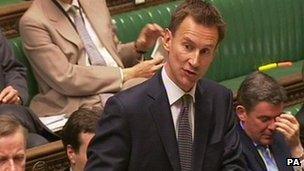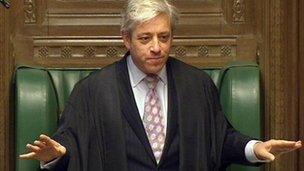Has Bercow 'lies' ruling overturned tradition?
- Published
Labour's Chris Bryant accused Jeremy Hunt of telling lies to MPs
When he ruled that a Labour MP could accuse with impunity Culture Secretary Jeremy Hunt of lying, Commons Speaker John Bercow prompted howls of protest from the Conservative backbenches.
For the wise owls who serve as clerks in the debating chamber, this was the first time in living memory the word "liar" had been deployed and then not forcibly retracted, a spokesman for the Speaker confirmed.
Yet the spokesman stood firm: Mr Bercow had been right, he said, and the clerks had given their full backing to the judgment.
So why have centuries of tradition seemingly been overturned?
'Foul calumny'
The first recorded retraction of a similar accusation in the bible of parliamentary practice, Erskine May, occurred in 1867, in a debate about the suspension of the right to trial by jury in Ireland.
Then MP for Cork John Maguire suggested that "the constitutional liberties of an entire nation" had been withdrawn, eliciting the ire of John Roebuck, then the MP for Sheffield.
"The House [of Commons] has been doing all it could to alleviate the physical, the constitutional, and the moral injuries of Ireland," he said.

MPs must have a thick skin in Commons debates but the word "liar" is rare
How could Mr Maguire "dare to say we are unjust to Ireland", he thundered: "I say that a more foul calumny, a more gigantic falsehood, was never uttered."
A series of points of order from the MP impugned by Mr Roebuck's choice of words prompted then Commons Speaker John Denison, who had been in the job for 10 years, to issue a ruling.
"I wish to ask you, Sir, as the highest authority in this House, is that language consistent with the usages of Parliament?" Mr Maguire demanded.
"Certainly not, if it was addressed to any particular member of this House," the historic response ensued.
Verbal gymnastics
This is the basis of the rules that remain in place to this day, which mean that harsh words can be directed in debate towards entire parties or groups of MPs that would be ruled out of order if they targeted an individual MP.
The Speaker subsequently confirmed: "I think the terms used by the honourable and learned gentleman are hardly such as should be used in this House."
The offending MP responded with a deft conditional response that both withdrew the remark and left his audience in no doubt about his true, undiminished point of view.

Has Speaker Bercow redefined what counts as Unparliamentary language?
"I always bow, Sir, to your commands, and if you think that I have said anything but the truth I withdraw the expression," he said.
This provided a blueprint for MPs' future verbal gymnastics, which pushed and thereby defined the limits of acceptable language in debate over the decades.
The MP for Whitby in 1887, Ernest Beckett, was rebuked for accusing a fellow MP of lying.
If he had said "falsehood", Beckett protested, he had meant "concoction"; the latter formulation was allowed to stand.
And in 1915, MP for West Ham South, William Thorne, complained that Sir Alfred Mond, the MP for Swansea Town and boss of a chemical manufacturing company, had been "bleeding the public by the prices you were charging during the War".
Having retorted that this was an "absolute lie", Sir Alfred inadvertently confirmed that to accuse a fellow MP of dishonesty is worse than accusing one of extortion according to the rules of Parliamentary procedure.
Inherent logic
These days, when MPs accuse their colleagues of misleading the House, they pre-emptively insert the word "inadvertently" beforehand to avoid censure.
So why was Labour MP Chris Bryant able to describe Mr Hunt as a "liar" in 2012, in spite of all this precedent and much more besides?
The answer, according to the Speaker's spokesman, is that Labour had put down a "substantive motion" which suggested that Mr Hunt had misled Parliament.
On a substantive motion about a member's conduct, the rules are quite different.
An obscure footnote to Erskine May attests that: "The suggestion that a Member is deliberately misleading the House is not parliamentary, and the proper course, if such an allegation is made, is to table the appropriate motion."
The Speaker's spokesman concluded: "The inherent logic of that is that if such a motion is being debated, then making such allegations needs to be in order."
It did not matter that Labour's motion was ambiguous as to whether Mr Hunt had inadvertently or deliberately misled the House, he argued: both possibilities were up for discussion.
Now that this logic has been laid bare, it remains to be seen whether a spate of similar motions will enable MPs to impugn the integrity of their adversaries more frequently.
- Published13 June 2012